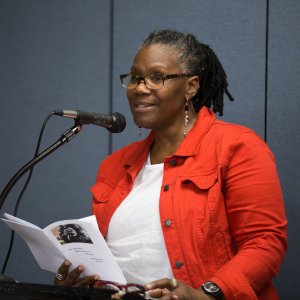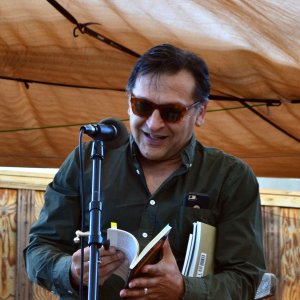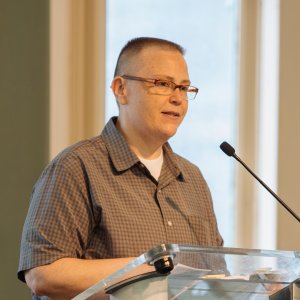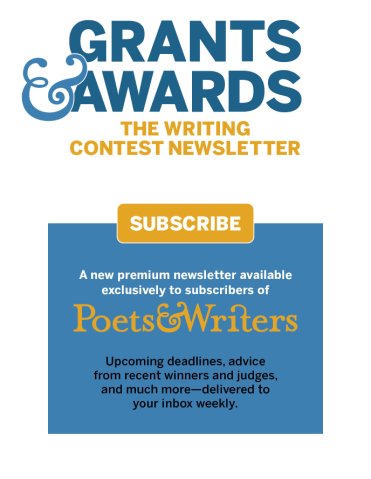A new report from PEN America’s annual Freedom to Write Index found that the number of writers placed behind bars reached a new high in 2024. The Freedom to Write Index has traced a steady increase in the number of writers incarcerated globally, from 238 in 2019 to 375 in 2024, up from 339 in 2023. In 2024, eighty writers were held in pre-trial detention, an increase from seventy-six in 2023. The majority of these cases were reported in China, Egypt, and Israel.
Writing Prompts
-
In the introduction to his translation of Egyptian author Naguib Mahfouz’s I Found Myself…the...
-
In the opening pages of We, the Casertas—a Gothic novel by the Argentine author Aurora...
-
From the wildflowers of William Shakespeare’s A Midsummer Night’s Dream to the white...
Tools for writers
Daily News
Two new documentaries, Banned Together (2024) and Free for All: The Public Library (2025), highlight anti-censorship activism amidst an increasing number of book bans in the U.S., Publishers Weekly reports. Banned Together, which is now streaming on Apple+ and Amazon Prime, follows high school students in South Carolina as they combat efforts to remove books from school library shelves. Free for All: The Public Library, which will be released on PBS Independent Lens on April 29, features a compilation of contemporary footage and archival material to trace the history of the library as a civic institution in the U.S.
Light and Thread (Moonji Publishing), a book featuring Han Kang’s Nobel Prize lecture, along with other essays and poems by the author, sold ten thousand copies in its first day on sale online, the Guardian reports.
Megan Mabee writes for Book Riot about how to recommend books like an expert. When recommending a book to someone, Mabee advises, consider that person’s favorite books, authors, genres, and preferred moods and pacing in storytelling. Mabee also encourages recommenders to consider a person’s hobbies, interests, and the media they consume—including television, films, and podcasts.
U.K. licensing bodies have announced a collective license that will allow authors to be compensated for the use of their works to train generative AI models, the Guardian reports. The collective license will be available to AI developers this summer and follows a survey conducted by the Authors’ Licensing and Collecting Society that found 81 percent of respondents wanted to be part of a collective licensing solution if case-by-case licensing was infeasible. The news of the license comes amidst a controversial proposal by the U.K. government to allow AI companies to freely mine copyrighted works unless rights holders opt out.
Literary activist groups have formally condemned Florida House Bill 1539, “legislation they claim would significantly restrict students’ access to books in Florida public schools,” Publishers Weekly reports. The bill would force school districts to remove any book judged to be “harmful to minors” within five days of a challenge, regardless of whether the book has gone through proper review processes. Organizations that signed the letter opposing the bill include American Booksellers for Free Expression, Authors Against Book Bans, the Authors Guild, and PEN America, among others.
All four Shakespeare folios will be auctioned with Sotheby’s for the first time as a collection since 1989, Fine Books & Collections reports. The set, which will be on sale in London on May 23, is estimated to be worth between 3.5 and 4.5 million pounds (between approximately $4,649,773 and $5,978,280).
Book publishers are observing a surging interest in the U.S. Constitution and have been printing new editions, the Associated Press reports. Random House announced a hardcover combined edition of the Declaration of Independence and the U.S. Constitution to be published in July, followed by a hardcover edition of the Federalist Papers to be published in November. The founding documents are all in the public domain and popular editions have also been released by Skyhorse, Penguin, Barnes & Noble, and others.
The Supreme Court justices seem ready to allow Maryland parents with religious objections to opt their children out of classes with storybooks featuring gay and transgender characters, the New York Times reports. The complaint from parents of multiple faiths claimed that the books “violated the First Amendment’s protection of the free exercise of religion.” This case is one in a string of recent examples where the Supreme Court has ruled in favor of expanding the role of religion in public life.
Ed Nawotka writes for Publishers Weekly about how emerging tech can help the publishing industry as it advocates for AI licensing frameworks to protect authors. For example, the new firm Valent has developed technology to identify when and how much copyrighted material has been used to train an AI model. Louis Hunt, the cofounder and CEO of Valent, explains that Valent also has algorithms that can quantify how certain data could improve an AI model’s performance, which would give copyright holders leverage in licensing negotiations.
The Guardian reports on a new wave of literary parties in the U.K. that feature poetry performances and DJ sets. The Soho Reading series began in the summer of 2023 when Tom Willis, a writer and PhD student, wanted to create a social scene with “literature as the center.” Other literary event series that draw a similarly diverse crowd include New Work, hosted by writers Rachel Connolly and Isis O’Regan, and the popular live readings of The Toe Rag, a London-based quarterly DIY arts and culture newspaper.
Supreme court justices are considering certain picture books with LGBTQ+ themes after parents in Maryland claimed they have a religious right to withdraw their children from classes on days that stories with gay and transgender themes are discussed, the New York Times reports.
The District Court of Rhode Island held a motion hearing on April 18 in an effort to preserve the Institute of Museum and Library Services, the Minority Business and Development Agency, and the Federal Mediation and Conciliation Service, Publishers Weekly reports. The lawsuit, which was filed by twenty-one attorneys general, seeks to restore funding to the agencies and avoid threats to grants that have already been awarded.
Author Neil Gaiman is seeking more than $500,000 from Caroline Wallner, one of the women who has come forward accusing him of sexual misconduct, New York magazine reports. Gaiman, who denies abusing Wallner, has filed a demand for arbitration, accusing Wallner of breaching the NDA she signed when she shared her story with the media.
Clare Mulroy writes for USA Today about the silent book clubs proliferating around the U.S. Though the name is a bit misleading, silent book clubs do not require participants to read the same book. Readers arrive to quietly read with other people. “The trend reflects a growing post-pandemic need to connect in person while also being mindful of social batteries,” Mulroy writes, adding that “Eventbrite shows a 223 percent increase in silent book club events from 2023 to 2024, especially in cities like Chicago, Indianapolis, New York City, Seattle, and Atlanta.”
The winners of the annual Publishing Triangle Awards, which celebrate LGBTQ+ literary excellence, were announced at the New School Thursday. The list of winners includes Blas Falconer, who won the Thom Gunn Award for Gay Poetry for Rara Avis (Four Way Books) and Cass Donish, who won the Audre Lorde Award for Lesbian Poetry for Your Dazzling Death (Knopf). Jiaming Tang won both the Ferro-Grumley Award for LGBTQ+ Fiction and the Edmund White Award for Debut Fiction for Cinema Love (Dutton).
The ACLU of Tennessee filed a lawsuit on April 16 to stop book bans in Rutherford County, Publishers Weekly reports. In the past year, the Rutherford County Board of Education has removed or restricted more than 140 titles from school libraries. The lawsuit argues that book bans are a direct violation of students’ First Amendment rights.
Three hundred people in Chelsea, Michigan, formed a human chain to move thousands of books from the old location of Serendipity Books to its new site, the Washington Post reports. Bookstore owner Michelle Tuplin said she had the idea to create a “book brigade,” but did not expect so many community members to show up. The group relocated 9,100 books in under two hours and a video of the event has been viewed more than 1.6 million times on TikTok. The new Serendipity Books will open on April 26, which is also Independent Bookstore Day.
The New York Public Library has announced the finalists for the 2025 Young Lions Fiction Award: ‘Pemi Aguda for Ghostroots (Norton), Eliza Barry Callahan for The Hearing Test (Catapult), Alexander Sammartino for Last Acts (Scribner), Santiago Jose Sanchez for Hombrecito (Riverhead), and Karla Cornejo Villavicencio for Catalina (One World). A panel of judges will select the winner of this year’s $10,000 prize, which will be announced during a ceremony on June 12 at 7 PM EDT.
Alexandra Alter writes for the New York Times about the ethical quandaries of publishing Joan Didion’s journal entries about therapy, as they appear are in Notes to John, forthcoming from Knopf on April 22. The posthumous work collects journal entries she wrote after sessions with a psychiatrist, during which she discussed subjects such as alcoholism, adoption, depression, anxiety, guilt, and her complex relationship with her daughter, Quintana. The notes are sometimes addressed only to her husband, John Gregory Dunne, another factor that has sparked some fans and friends of Didion to wonder if the publication is invasive. “Didion was famously guarded,” Alter writes, but she was also “a meticulous note taker and record keeper who was savvy about the publishing industry; she likely knew that any literary documents she left behind could be released.”
Literary Events Calendar
- April 27, 2025
Kickstarter for Writers
Online2:00 PM - 4:00 PM EDT - April 27, 2025
Writing and Blending Genre Fiction with Terrence McCauley (via Zoom)
Online12:30 PM - 4:30 PM EDT - April 27, 2025
We've Only Just Begun: Publishing Poetry After 65 with Jo Ann Mort
Online12:30 PM - 4:30 PM EDT
Readings & Workshops
Poets & Writers Theater
Most Recent Items
Classifieds
Writing contests, conferences, workshops, editing services, and more.
Jobs for Writers
Search for jobs in education, publishing, the arts, and more.











